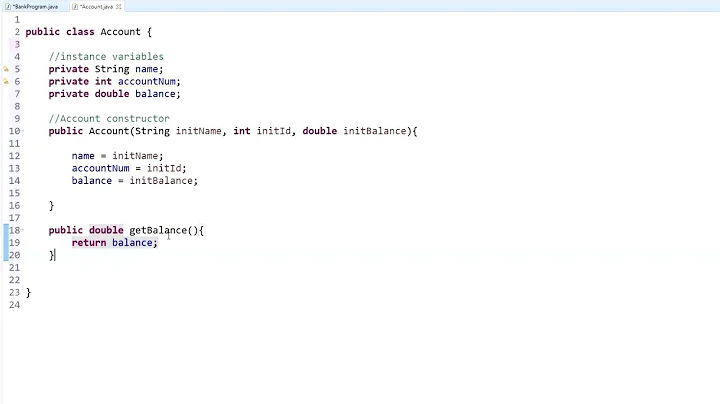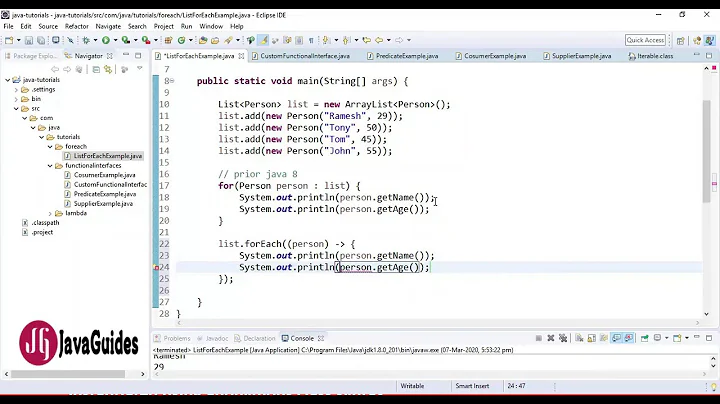How to loop over a Class attributes in Java?
Solution 1
There is no linguistic support to do what you're asking for.
You can reflectively access the members of a type at run-time using reflection (e.g. with Class.getDeclaredFields() to get an array of Field), but depending on what you're trying to do, this may not be the best solution.
See also
Related questions
- What is reflection, and why is it useful?
- Java Reflection: Why is it so bad?
- How could Reflection not lead to code smells?
- Dumping a java object’s properties
Example
Here's a simple example to show only some of what reflection is capable of doing.
import java.lang.reflect.*;
public class DumpFields {
public static void main(String[] args) {
inspect(String.class);
}
static <T> void inspect(Class<T> klazz) {
Field[] fields = klazz.getDeclaredFields();
System.out.printf("%d fields:%n", fields.length);
for (Field field : fields) {
System.out.printf("%s %s %s%n",
Modifier.toString(field.getModifiers()),
field.getType().getSimpleName(),
field.getName()
);
}
}
}
The above snippet uses reflection to inspect all the declared fields of class String; it produces the following output:
7 fields:
private final char[] value
private final int offset
private final int count
private int hash
private static final long serialVersionUID
private static final ObjectStreamField[] serialPersistentFields
public static final Comparator CASE_INSENSITIVE_ORDER
Effective Java 2nd Edition, Item 53: Prefer interfaces to reflection
These are excerpts from the book:
Given a
Classobject, you can obtainConstructor,Method, andFieldinstances representing the constructors, methods and fields of the class. [They] let you manipulate their underlying counterparts reflectively. This power, however, comes at a price:
- You lose all the benefits of compile-time checking.
- The code required to perform reflective access is clumsy and verbose.
- Performance suffers.
As a rule, objects should not be accessed reflectively in normal applications at runtime.
There are a few sophisticated applications that require reflection. Examples include [...omitted on purpose...] If you have any doubts as to whether your application falls into one of these categories, it probably doesn't.
Solution 2
Accessing the fields directly is not really good style in java. I would suggest creating getter and setter methods for the fields of your bean and then using then Introspector and BeanInfo classes from the java.beans package.
MyBean bean = new MyBean();
BeanInfo beanInfo = Introspector.getBeanInfo(MyBean.class);
for (PropertyDescriptor propertyDesc : beanInfo.getPropertyDescriptors()) {
String propertyName = propertyDesc.getName();
Object value = propertyDesc.getReadMethod().invoke(bean);
}
Solution 3
While I agree with Jörn's answer if your class conforms to the JavaBeabs spec, here is a good alternative if it doesn't and you use Spring.
Spring has a class named ReflectionUtils that offers some very powerful functionality, including doWithFields(class, callback), a visitor-style method that lets you iterate over a classes fields using a callback object like this:
public void analyze(Object obj){
ReflectionUtils.doWithFields(obj.getClass(), field -> {
System.out.println("Field name: " + field.getName());
field.setAccessible(true);
System.out.println("Field value: "+ field.get(obj));
});
}
But here's a warning: the class is labeled as "for internal use only", which is a pity if you ask me
Solution 4
Simple way to iterate over class fields and obtain values from object:
Class<?> c = obj.getClass();
Field[] fields = c.getDeclaredFields();
Map<String, Object> temp = new HashMap<String, Object>();
for( Field field : fields ){
try {
temp.put(field.getName().toString(), field.get(obj));
} catch (IllegalArgumentException e1) {
} catch (IllegalAccessException e1) {
}
}
Solution 5
Java has Reflection (java.reflection.*), but I would suggest looking into a library like Apache Beanutils, it will make the process much less hairy than using reflection directly.
Related videos on Youtube
Comments
-
Zakaria over 4 years
How can I loop over a class attributes in java dynamically.
For eg :
public class MyClass{ private type1 att1; private type2 att2; ... public void function(){ for(var in MyClass.Attributes){ System.out.println(var.class); } } }is this possible in Java?
-
Zakaria almost 14 yearsin fact, according to value of fields, I want to write or not write the value of each field?
-
polygenelubricants almost 14 years@Zakaria: yes, you can accomplish this with reflection, but depending on what is it that you're trying to do, there are much better designs.
-
Zakaria almost 14 yearsIn fact, I have a report to generate from a class, and depending on the value of class fields I want to put or not those fields, what's the best design that can I implement.?
-
polygenelubricants almost 14 years@Zakaria: Unless you want a general purpose highly customizable class report generator that works with any class, you should just stay away from reflection and just write a specific taylor-made solution for this particular class in your application domain.
-
Zakaria almost 14 yearsWhat I want to do is to test on field value, if isn't null I want to include it in report and vice versa. I have a lot of attributes and I don't want to test them all manually so I thought that using reflection will resolve the problem. I will use it in one class. I just want to add that the result of this function is an array of String. (String[])
-
polygenelubricants almost 14 years@Zakaria: go ahead and try reflection out then. There's
Field.getthat you can use to read the values of a field reflectively. If it'sprivate, you may be able to get around that withsetAccessible. Yes, reflection is very powerful and it lets you do things like inspectingprivatefields, overwritingfinalfields, invokingprivateconstructors, etc. If you need further assistance with the design aspect, you should probably write a new question with a lot more information. Perhaps you don't need these many attributes in the first place (e.g. useenumorList, etc). -
user102008 almost 13 yearsgenerics has no use here. just do
static void inspect(Class<?> klazz) -
Nomad almost 12 years@polygenelubricants, thanks for such a detailed and nice answer.
-
hbprotoss over 8 yearsIs there any way to only get properties of the bean, not the class? i.e. avoid MyBean.class returned by getPropertyDescriptors
-
 Jörn Horstmann over 8 years@hbprotoss if I understand you correctly, you can check for
Jörn Horstmann over 8 years@hbprotoss if I understand you correctly, you can check forpropertyDesc.getReadMethod().getDeclaringClass() != Object.class, or you can specify a class to stop analysis as the second parameter likegetBeanInfo(MyBean.class, Object.class). -
 Gewure over 7 yearsi like how the arguments name is "klazz" - thats very klazzy :)
Gewure over 7 yearsi like how the arguments name is "klazz" - thats very klazzy :) -
shinzou over 5 yearsomitted on purpose?
-
 Rickey over 4 yearsA class perhaps or any object.
Rickey over 4 yearsA class perhaps or any object. -
QWERTY over 4 years@Rickey Is there anyway to set a new value to the attributes by looping each fields?
-
 Rickey over 4 years@hyperfkcb You may get an modification exception when attempting to change values of properties/fields you're iterating over.
Rickey over 4 years@hyperfkcb You may get an modification exception when attempting to change values of properties/fields you're iterating over. -
 salerokada about 2 yearsMy problem with this solution is that getters (propertyDesc) are sorted alphabetically and I need original order of fields/getters.
salerokada about 2 yearsMy problem with this solution is that getters (propertyDesc) are sorted alphabetically and I need original order of fields/getters.







